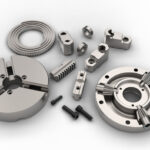CNC parts are precision-engineered components produced through Computer Numerical Control (CNC) machining. These parts are essential in a wide range of industries, from aerospace and automotive to medical and electronics, due to their accuracy, durability, and consistency. CNC technology allows manufacturers to create complex shapes and detailed designs that would be nearly impossible to achieve with manual machining.
What Are CNC Parts?
CNC parts are manufactured using CNC machines that operate based on programmed instructions derived from CAD (Computer-Aided Design) models. The process involves removing material from a solid block or sheet to create a component with exact dimensions and specifications. The high level of control ensures each part meets precise tolerances, making them ideal for critical applications.
Types of CNC Parts
CNC machining can produce a wide variety of parts, including:
- Automotive Components: Engine blocks, transmission housings, and custom performance parts.
- Aerospace Parts: Turbine blades, structural components, and brackets designed for high strength and low weight.
- Medical Devices: Surgical instruments, orthopedic implants, and prosthetic parts with smooth finishes and tight tolerances.
- Industrial Machinery Parts: Gears, shafts, and housings for manufacturing equipment.
- Electronic Housings: Precision enclosures for circuit boards and delicate components.
Materials Used for CNC Parts
CNC machining supports a wide range of materials, making it suitable for diverse applications. Common materials include:
- Metals: Aluminum, stainless steel, brass, titanium, and copper for high strength and durability.
- Plastics: ABS, nylon, PEEK, and polycarbonate for lightweight and corrosion-resistant parts.
- Composites: Carbon fiber and fiberglass for high-performance, lightweight structures.
Advantages of CNC Parts
- Precision and Accuracy – CNC parts can be produced with tolerances as tight as ±0.001 inches, ensuring a perfect fit in complex assemblies.
- Consistency – Automated control ensures identical parts in every production run, reducing variation.
- Complex Geometries – CNC technology allows for intricate designs and features like undercuts and complex curves.
- Fast Production – High-speed machining and automation reduce production times.
- Cost Efficiency in Bulk Production – While setup costs may be higher, large runs of CNC parts become cost-effective.
Applications in Different Industries
- Aerospace: Lightweight, high-strength parts capable of withstanding extreme conditions.
- Automotive: Custom parts for performance upgrades, as well as mass-produced factory components.
- Medical: Precision surgical tools and implantable devices that meet strict safety standards.
- Energy: Parts for turbines, pumps, and generators.
Quality and Inspection
CNC parts undergo rigorous quality checks using tools like coordinate measuring machines (CMMs) and optical scanners to ensure every dimension matches the design specifications.
Conclusion
CNC parts play a vital role in today’s manufacturing landscape, offering unmatched precision, versatility, and reliability. With advancements in automation, robotics, and material technology, CNC machining will continue to produce high-quality parts that meet the growing demands of industries worldwide.

